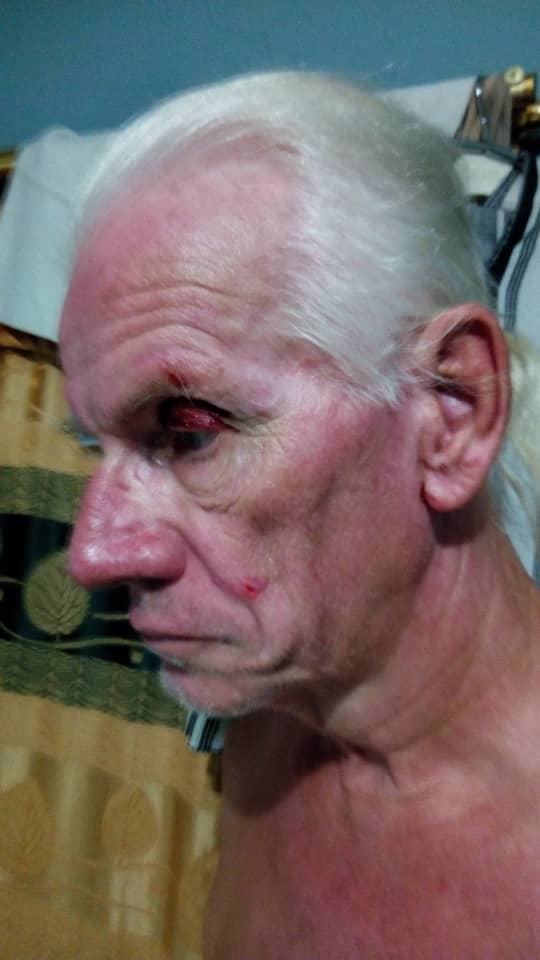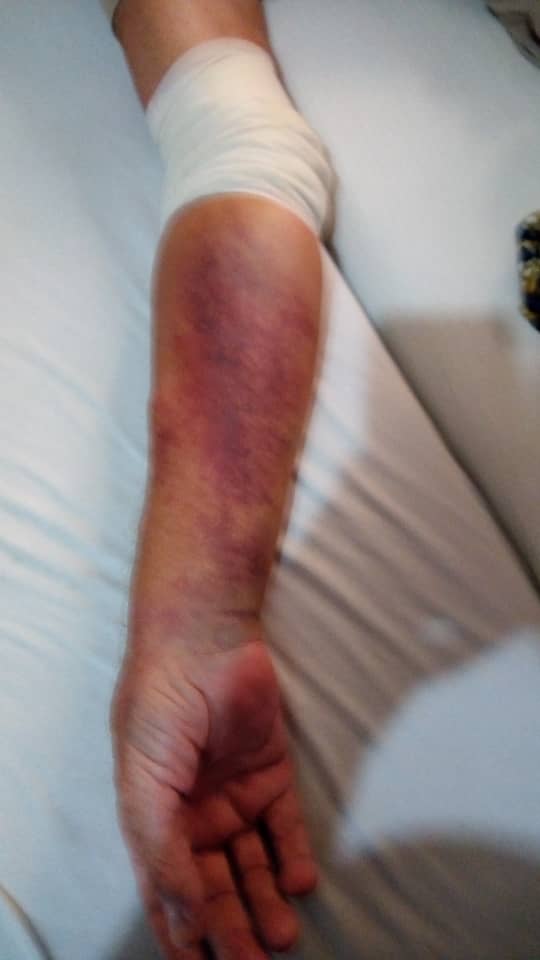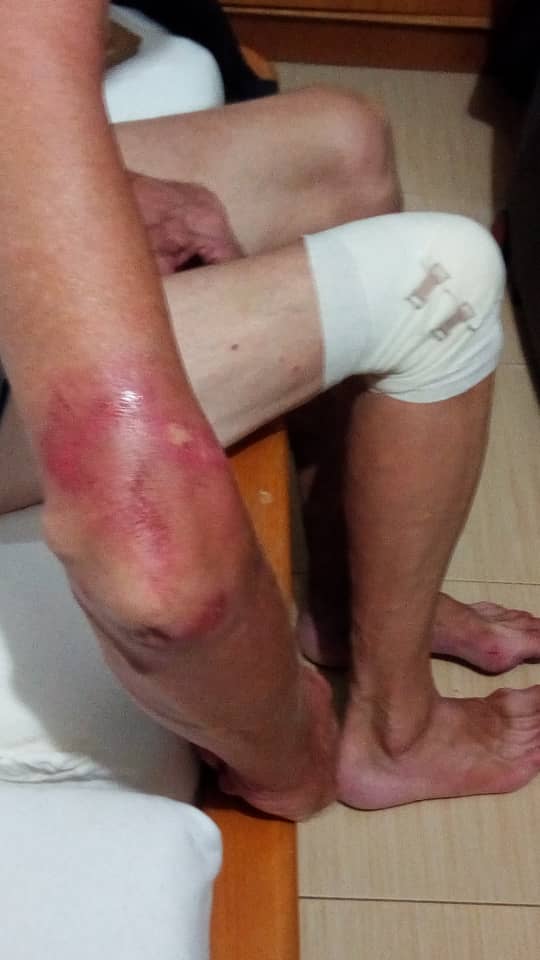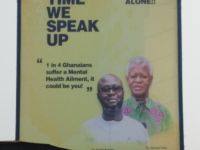
Roland Kropat; a German based in the Ashanti region of Ghana nearly lost his life when he took on a neighborhood church for noise making.
Roland tells rawgist.com the Bethel church located in his neighbourhood at Worakese near lake Bosomtwe has been making serious noise for the past four years he has lived there.
He recounts that he has been to the church a number of times to ask them to keep the noise down since he sometimes could not sleep due to the high volume of the sound systems.
He says the church was unhappy with his consistent visits and efforts to get them to reduce the noise. He was attacked sometime last year by some members of the church.

About two weeks ago, the church consistently turned up their sound system so loud at night that, he was forced to go and try to reason with them. When he realized they would not budge, he took out the plugs out of the socket, disconnecting the sound system. This action however infuriated some youth of the church who pounced on him and beat him till he bled.
Photos and videos in possession of rawgist.com show how 64 year-old Roland was beaten.
Roland tells Bernard Buachi of rawgist.com he had a cracked bone, which he proved with an x-ray picture. He also had a big bruise and still has pains in the forearm.
He says he has reported the matter to the Kuntanase Police who say they are investigating the matter.

Rawgist.com will keep you updated on this matter.
From the Ghana (1960) Criminal Code plus Amendments, and the Constitution of the Republic of Ghana 1992 it is unequivocally obvious to me that laws are in place to prevent the harm caused by noise pollution:
From the Criminal Code:
Section 22—Duty to Prevent Felony.
Every person who, knowing that a person designs to commit or is committing a felony, fails to use all reasonable means to prevent the commission or completing thereof, is guilty of a misdemeanour.
Section 69—Causing Harm.
Whoever intentionally and unlawfully causes harm to any person shall be guilty of second degree felony.
Section 71—Exposing Child to Danger.
(1) Whoever unlawfully—
(a) exposes a child to danger or abandons a child under twelve years; or
(b) exposes any physically or mentally handicapped child to danger or abandons a physically or mentally handicapped child in such a manner as to cause any harm to the child—
shall be guilty of a misdemeanour.
Section 72—Negligently Causing Harm.
Whoever negligently and unlawfully causes harm to any person shall be guilty of a misdemeanour.
Section 287—Carrying on of Noxious Trade, and other interference with Public Rights. Whoever, without lawful authority or excuse (the proof whereof shall lie on him) commits any of the following nuisances, namely— (a) carries on any noxious, offensive, or noisy business at any place, or causes or permits any noxious or offensive matter to be collected or continue at any place, or so keeps any animals at any place, as to impair or endanger the health of the public inhabiting or using the neighbourhood of that place, or as to cause material damage to the lands, crops, cattle, or goods of such public, or as to cause material interruption to such public in their lawful business or occupations, or as to materially affect the value of their property; or (b) so makes, keeps, or uses any explosive matter, or any collection of water, or any other dangerous or destructive thing, or any building, excavation, open pit, or other structure, work or place, or so keeps any animal or permits to be at large, as to cause danger of harm or damage to the persons or property of the public; or any well, spring, or reservoir, so as to deprive the public of the benefit thereof; or (c) corrupts or fouls the water of any public well, tank, spring, reservoir, or place used or intended for supplying water to man or for fish culture, shall be liable to a fine not exceeding ¢500,000 and shall, upon conviction for a continuance or repetition of any such offence, be guilty of a misdemeanour.
Section 288—Explanation as to Carrying on of Noxious Trade, etc. The following provisions shall have effect with respect to the nuisance of carrying on a noxious, offensive, or noisy business, at any place, or of causing or permitting noxious or offensive matter to be collected or continue at any place, or of keeping animals at any place as mentioned in this Chapter, namely— (a) “business” includes not only any trade, manufacture, work, business, or occupation carried on for gain, but also any continued or frequent repetition of any act or series of acts of any kind; and (b) it is necessary, in order that a person may be punishable in respect of any such nuisance, that the prejudice or danger caused thereby should extend to persons inhabiting or occupying, under separate tenancies, not less than three houses or other tenements. Section 289—Explanation as to Obstruction of Public Way. (1) A person shall not be guilty, within the meaning of this Chapter, of obstructing the public use of any public way or work by reason only of his being a party to any meeting or assembly assembled in, or upon or near any public way or work, unless the purposes of such assembly are or include the obstruction of the public by force or threats or show of force. (2) “Obstruction” of the public use of a public way or work includes the making or using of any fetish or charm for the purpose of preventing any person from using such way or work.
Nuisances and Obstructions in Streets, and the like
Section 296—Throwing Rubbish in Street.
Whoever does any of the following acts shall be liable to a fine not exceeding ¢200,000 namely—
Causing Noise in Town.
(7) in any town wilfully or wantonly, and after being warned to desist, makes any loud or unseemly noise howsoever caused to the annoyance or disturbance of any person;
Drumming, etc., in Town at Night.
(8) in any town, without a licence in writing from the Minister or a local authority beats or plays any drum, gong, tom-tom, or other similar instrument of music between eight o’clock at night and six in the morning;
Section 298—Acts tending to disturb the peace in a public place.
Whoever in any public place, or in any place within sight or hearing of persons then being in a place, disturbs the peace by fighting or quarrelling with any other person, or by making any loud or unseemly noise; or abets an unlawful fight, or uses or applies to any other person then being in such public place or within sight or hearing thereof, any violent or abusive term of reproach, or sings any profane, indecent, or obscene song, or exposes any defamatory of insulting writing or object, or with the intention of annoying or irritating any other person, sings any scurrilous or abusive song or words, whether any person be particularly addressed therein or not or is guilty of any riotous, indecent, disorderly, insulting behaviour, to the obstruction or annoyance of any passenger or person in such public place, shall be liable to a fine not exceeding ¢200,000.00.
Please note the following taken from The Criminal Code 1960:
PART I—GENERAL PROVISIONS
CHAPTER 1—PRELIMINARY MATTERS
Section 1—Interpretation
“harm” means any bodily hurt, disease, or disorder, whether permanent or temporary;
“public place” includes any public way and any building, place, or conveyance to which for the time being the public are entitled or permitted to have access, either without any condition or upon condition of making any payment, and any building or place which is for the time being used for any public or religious meeting or assembly, or as an open Court;
“public way” includes any highway, market place, lorry park, square, street, bridge, or other way which is lawfully used by the public;
acts are done “publicly”—
(1) if they are so done in any public place as to be likely to be seen by any person, whether such person be or be not in a public place; or
(2) if they are so done in any place, not being a public place, as to be likely to be seen by any person in any public place;
“town” means—
(a) the area of authority of a Municipal or Urban Council; or
(b) any place to which the Towns Ordinance applies; or
(c) any place (whether a town or not) which the Minister may by executive instrument order.
From the Constitution under Chapter Five, Fundamental Human Rights and Freedoms:
12.(1) The fundamental human rights and freedoms enshrined in this chapter
shall be respected and upheld by the Executive, Legislature and Judiciary
and all other organs of government and its agencies and, where applicable
to them, by all natural and legal persons in Ghana, and shall be
enforceable by the Courts as provided for in this Constitution.
12.(2) Every person in Ghana, whatever his race, place of origin, political
opinion, colour, religion, creed or gender shall be entitled to the
fundamental human rights and freedoms of the individual contained in this
Chapter but subject to respect for the rights and freedoms of others and for
the public interest.
25 (1) All persons shall have the right to equal educational opportunities and facilities and with a view to achieving the full realisation of that right
What do you think about this piece? Share your comment in the comment thread and share the story using the social media buttons above. Thank you.





